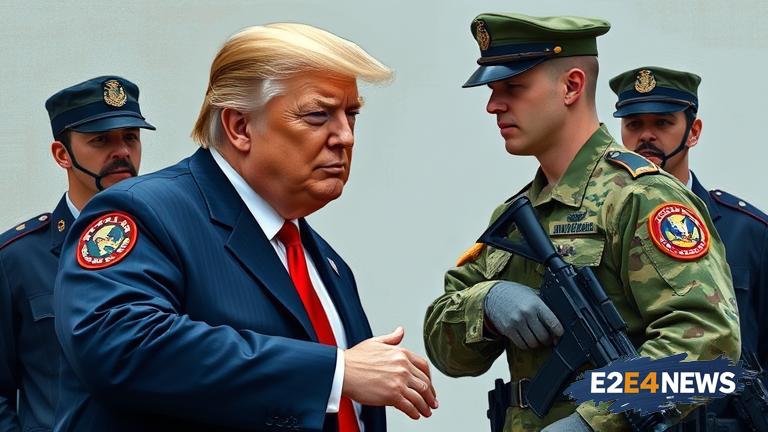In a surprise move, President Trump has announced a significant expansion of the National Guard’s role in law enforcement, a decision that has been met with both praise and criticism. The new order, which was signed on August 25, 2025, aims to increase the National Guard’s involvement in domestic law enforcement efforts, particularly in areas such as border security, counter-terrorism, and disaster response. According to the White House, the expansion is intended to enhance the National Guard’s ability to support state and local law enforcement agencies, while also providing additional resources and personnel to address emerging threats. The move has been welcomed by some as a necessary step to improve public safety and security, while others have expressed concerns about the potential erosion of civil liberties and the militarization of law enforcement. Critics argue that the expansion could lead to an increased risk of abuse of power, particularly in communities of color, and that it may undermine the trust between law enforcement and the public. On the other hand, supporters of the move argue that it will help to improve response times, enhance coordination between agencies, and provide critical support to overwhelmed law enforcement departments. The National Guard has a long history of supporting law enforcement efforts, dating back to the 19th century, and has been involved in a range of domestic operations, including disaster response, border security, and counter-terrorism. However, the new order marks a significant shift in the Guard’s role, with a greater emphasis on proactive law enforcement and a more integrated approach to supporting state and local agencies. The expansion is also expected to involve the deployment of additional National Guard personnel and equipment, including drones, helicopters, and other specialized assets. While the exact details of the expansion are still unclear, it is expected to involve a significant increase in funding and resources for the National Guard, as well as new training and equipment for Guard personnel. The move has been praised by some law enforcement leaders, who argue that it will help to address the growing threats posed by terrorism, cybercrime, and other emerging challenges. However, others have expressed concerns about the potential impact on civil liberties, particularly in light of recent controversies surrounding police brutality and racial profiling. The American Civil Liberties Union (ACLU) has already spoken out against the move, arguing that it could lead to a ‘militarization’ of law enforcement and a erosion of trust between law enforcement and the public. The expansion has also sparked debate about the role of the National Guard in domestic law enforcement, with some arguing that it is a necessary step to improve public safety, while others argue that it undermines the principles of federalism and the separation of powers. As the debate continues to unfold, it is clear that the expansion of the National Guard’s role in law enforcement will have significant implications for public safety, civil liberties, and the future of law enforcement in the United States. The move is also likely to have significant implications for the 2025 presidential election, with candidates on both sides of the aisle weighing in on the issue. In conclusion, the expansion of the National Guard’s role in law enforcement is a complex and contentious issue, with both supporters and critics presenting compelling arguments. As the country continues to grapple with the challenges of public safety and national security, it is clear that the debate over the National Guard’s role will be an important one to watch in the coming months and years. The White House has defended the move, arguing that it is a necessary step to improve public safety and security, while also providing critical support to overwhelmed law enforcement departments. However, critics argue that the expansion could have unintended consequences, including the erosion of civil liberties and the militarization of law enforcement. The issue is likely to be the subject of ongoing debate and controversy, with both sides presenting compelling arguments. Ultimately, the expansion of the National Guard’s role in law enforcement will require careful consideration and oversight to ensure that it is implemented in a way that balances public safety with the need to protect civil liberties. The move has significant implications for the future of law enforcement in the United States, and will likely be the subject of ongoing debate and discussion in the coming months and years.
